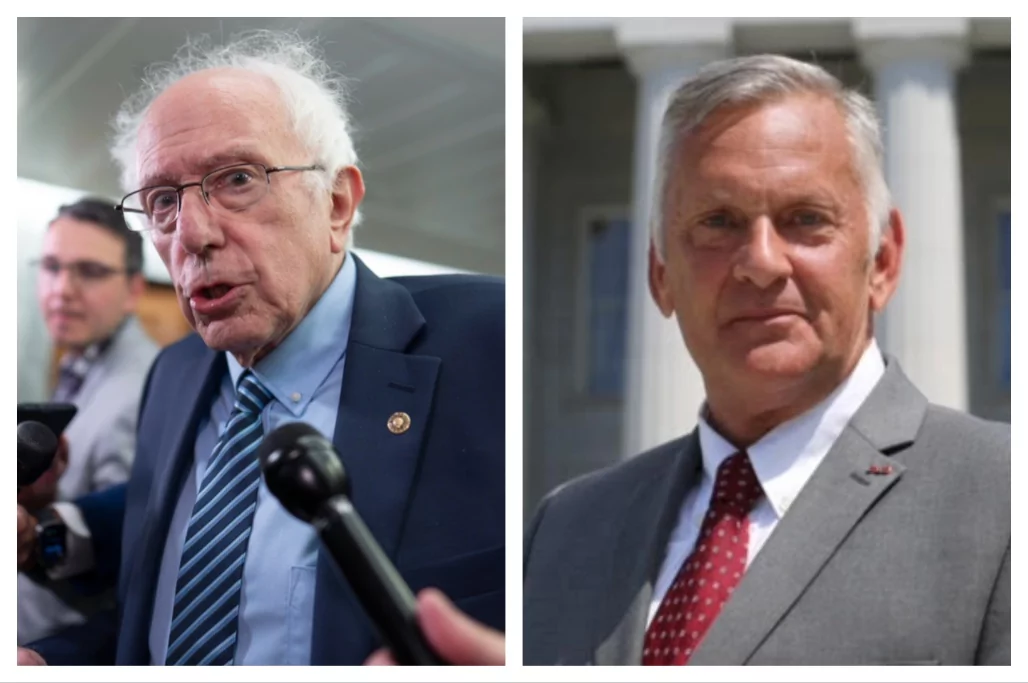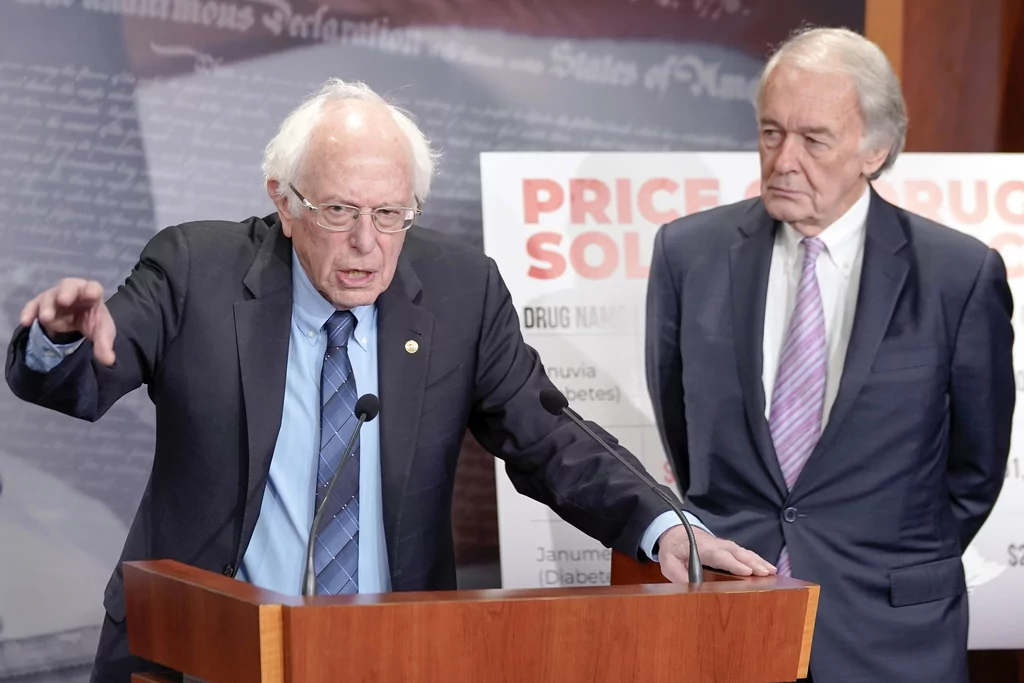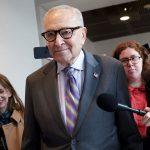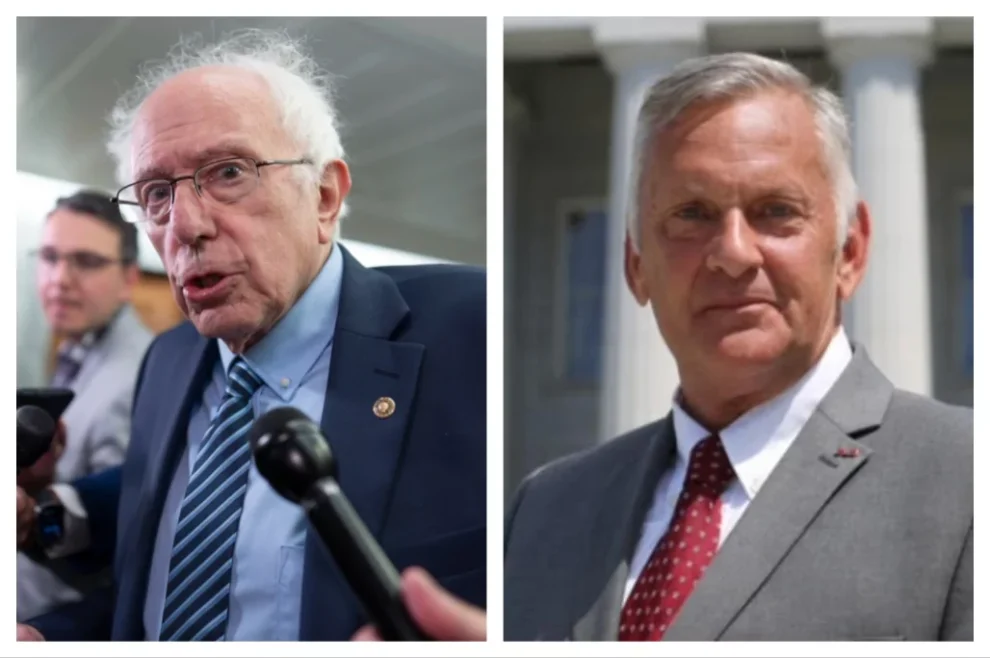Sen. Bernie Sanders (I-VT) finds himself in a familiar position Tuesday — on the Vermont ballot — and vying for another term of elected office as he’s done for more than four decades.
Sanders is running unopposed in the 2024 primary Tuesday with no challengers from the Democratic or independent side, setting himself up for a fourth term in the Senate as he fashions himself as the progressive standard bearer for the country.
With President Joe Biden, 81, bowing out of the presidential race, Sanders, 82, is taking on the role of elder statesman as he nudges the next generation of Democratic Party leaders into a big government agenda.
Democratic strategist Brad Bannon told the Washington Examiner that Sanders’s decision not to seek the presidency again as he did in 2016 and 2020 “basically freed him to be this national spokesman for the progressive wing of the party.”
“The party has moved toward Bernie Sanders,” Bannon said. “So he lost his battles for president, but he won the battle for the heart and soul of the Democratic Party.”
“He has a safe seat in Vermont, so he really doesn’t have to worry about politics, so he’s focused on progressive policy,” Bannon added.
Sanders will face Republican Gerald Malloy in the 2024 general election for Vermont’s Senate race. Malloy lost his campaign for the state’s other Senate seat in 2022.
Both candidates ran unopposed in their respective primaries on Tuesday: Sanders, who has been serving in the Senate since 2007 and Congress long before then; and Malloy, who lost to now-Sen. Peter Welch (D-VT) for the open seat left vacant by former Sen. Patrick Leahy in the midterm elections.
The senator will appear on the Democratic primary ballot as he has for several years despite being an independent since 1978. Vermont has open primaries, allowing unaffiliated or independent votes to vote for either candidate.

Malloy raises Sanders’s age and ability to deliver
Sanders’s popularity in the state of Vermont has allowed him to skate easily to victory over the last few cycles. In 2018, Sanders won the general election with 67% of the vote and with 71% of the vote in 2012. Unlike his congressional colleagues, Sanders does not pursue funding through super PACs or from wealthy donors and instead focuses on small-dollar donations.
DecisionDesk HQ finds Sanders has a greater than 99% chance of winning in November. However, Malloy believes he will be successful this cycle due to high inflation, high taxes, and clean energy policies supported by Sanders and the Biden-Harris administration.
He said in statements to the Washington Examiner that his work in the business industry, as well as federal agencies like the departments of Homeland Security and Health and Human Services, make him a better fit for office.
“My opponent is a socialist, career politician,” Malloy said. “He does not have work, government, business, military, or foreign policy experience. He has had 34 years as a member of Congress. He has delivered very little for Vermont. He speaks of lowering costs or free healthcare, housing, education — false promises as all have gone up, even as he is Senate chair of HELP Committee. He speaks of the working class but has no work experience.”
“His Twitter/X site banner reads ‘The struggle continues.’ It certainly does, by design,” Malloy continued. “His platform: false promises and scare tactics of existential climate crisis. He will be 83 very soon, well into 89 if reelected.”
In 2022 ahead of the midterm elections, Sanders had the highest favorability rating among possible presidential contenders at 46% compared to President Joe Biden’s 43%.
Bannon also noted that if Sanders, at 82, had decided to run for president in 2024, the age concerns that plagued Biden during the second half of his administration would have trailed Sanders as well.
Nathan Gonzales, editor for Inside Elections, echoed Bannon’s comments, telling the Washington Examiner that Sanders hasn’t had a “public elderly episode” that has constituents questioning whether the senator can do his job — unlike Biden, whose gaffes, misnaming of public figures, and lackluster debate performance caused members of his own party to call on him to step aside as the nominee.
“The comparison between Biden and Sanders is a good example that each person ages differently,” Gonzales said.

Sanders hopes Harris will continue on a progressive path
After Biden stepped aside as the presumptive nominee and endorsed Kamala Harris, Sanders, a staunch Biden supporter, also decided to throw his support behind vice president. Sanders has called Biden the “most progressive president” in history, but eyes will now be on Harris to see whether she will continue to jettison left-wing policies she once embraced, including “Medicare for All.”
“She should be very proud of the record of the Biden-Harris administration in taking on the greed of the pharmaceutical industry, lowering the cost of prescription drugs, creating millions of jobs by rebuilding our crumbling infrastructure — we’ve done more in that area than any administration in history,” Sanders said on CNN’s State of the Union on Sunday.
Sanders said Harris is running a “very strong campaign” and thinks she is talking to people from all sides to build an agenda that will win in November.
Host Dana Bash asked Sanders whether he is concerned about Harris reversing her stance on several progressive policies such as Medicare for All, legislation that she co-sponsored with Sanders when she was a senator in 2017 that would eliminate private insurance.
Sanders pointed to a poll from his campaign that found most people are in favor of several progressive policy areas that Harris is diverting from.
“I think the agenda that we have talked about for working people, expanding Medicare, expanding Social Security, raising the minimum wage, demanding that the wealthy start paying their fair share of taxes — this is an agenda that is not only good policy, it’s what we should be doing when so many of our working people are struggling, but it is good politics, as well,” Sanders said.
The Vermont senator added that Harris should be coming out with an economic agenda this week, so “we’ll see what she has to say.”
Sanders has little to fear from AIPAC compared to progressive colleagues
With Harris as the presumptive Democratic nominee and Gov. Tim Walz (D-MN) as her running mate, the ticket has appeased progressives who had reservations about Harris’s other choices, including Gov. Josh Shapiro (D-PA) for his strong support of Israel.
Sanders announced he would seek reelection in early May, at a critical point for Democrats as the party continued to fracture over the war between Israel and Hamas.
Like most congressional progressives, Sanders has been vocal about the need for immediate humanitarian aid to the Palestinian civilians in the Gaza Strip, as well as openly critical of Biden’s handling of the United States’s relationship with the Jewish state. Sanders did not attend Israeli Prime Minister Benjamin Netanyahu’s speech before a joint session of Congress in July.
The Israel-Hamas war has divided progressives from the rest of the Democratic conference, particularly as pro-Israel groups like the American Israel Public Affairs Committee have funneled millions into primary races to defeat members of the progressive “Squad.” As a co-founder of the Congressional Progressive Caucus, Sanders had rallied behind Rep. Jamaal Bowman (D-NY) in the days leading up to the primary the New Yorker ultimately lost.
“What this campaign is about is telling the billionaire class and their greed and their super PACs that they are not going to destroy American democracy,” Sanders told rally attendees on June 22.
While Rep. Summer Lee (D-PA) was able to survive a targeted AIPAC campaign, Bowman and Cori Bush (D-MO) were ousted thanks in part to the millions AIPAC’s PAC, United Democracy Project, threw behind their opponents. Rep. Ilhan Omar (D-MN) is facing a primary challenge from a Democrat who is favored by AIPAC.
Sanders, who has been in politics for over 40 years, first as a mayor in Vermont, is not a vulnerable target of AIPAC. Gonzales said the pro-Israel group has been strategic in its targets in the 2024 cycle and looking for candidates who are beatable at the ballot box — and Sanders does not fit the bill.
CLICK HERE TO READ MORE FROM THE WASHINGTON EXAMINER
Gonzales added that Bush and Bowman had their “own problems” beyond just their stance on the Israel-Hamas war, “issues that Sanders just doesn’t have.”
“Trying to knock off a one or two-term incumbent is very different than defeating a 30-year legend,” Gonzales said. “Sanders is well-liked in Vermont and candidates aren’t lining up to take him out. You can’t beat somebody with nobody.” The Washington Examiner reached out to Sanders for comment.
The Washington Examiner reached out to Sanders for comment.
























